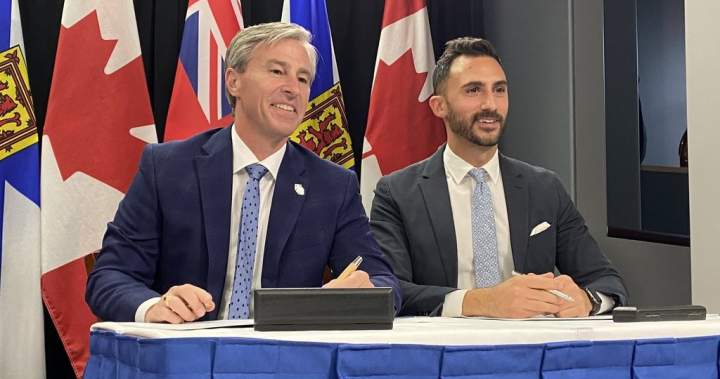Nova Scotia intends to learn more about small modular reactor (SMR) technology from Ontario.
Premier Tim Houston, who became energy minister this week in a cabinet shuffle, signed a memorandum of understanding (MOU) Thursday with Ontario Minister of Energy and Mines Stephen Lecce.
“We will share knowledge and expertise from technological readiness and regulatory frameworks to supply chains, financing, and nuclear waste management. We’ll work together to engage with the federal government,” said Houston.
New Brunswick, Saskatchewan and Alberta have signed similar agreements with Ontario.
The Canadian Nuclear Safety Commission says small modular reactors are smaller in size and have a smaller energy output than traditional nuclear power reactors.
The commission also says the smaller reactors have enhanced safety features.
Ontario’s Darlington nuclear plant was named as a project of national interest by the prime minister this fall.
Expansion of the current Darlington nuclear plant in southern Ontario will make Canada the first G7 country with an operational SMR.
It’s estimated Ontario’s project, which is set to be connected to the grid by 2029, would provide clean power to 300,000 homes and create 200 operations jobs, in addition to 1,600 jobs during construction.
Shortly before the agreement signing, the federal and Ontario governments announced they would be putting a total of $3 billion toward a project to build four small nuclear reactors in the Greater Toronto Area.

Get daily National news
Get the day’s top news, political, economic, and current affairs headlines, delivered to your inbox once a day.
“This is about value added to our Ontario ratepayers and taxpayers. However, we’re Canadians and we’re on Team Canada. Premier Houston and Premier Ford have a strong alliance when it comes to building out that clean energy vision,” said Lecce.
“Going first allows us to share the best practices, the lessons learned with our colleagues east and west.”

Despite signing the MOU, Houston says the technology won’t be coming to Nova Scotia soon.
“At this stage we don’t have a contract to buy one. We haven’t committed any dollars towards it right now. We need to be part of the process, so we understand what’s possible,” he said.
But the Official Opposition questions what the actual benefit would be for Nova Scotians to bring the technology to the province.
“It’s not going to help us with our energy mix. It’s not going to help us with our energy affordability, and we don’t see any jobs coming,” said NDP Leader Claudia Chender.
“I think it was yet another shiny announcement when what we’re actually looking for our results.”
Environmental concerns
Environmental groups are voicing their concerns with the MOU and the province’s intentions when it comes to pursuing the technology.
“I don’t see it as a practical solution. I see it as … an industrial greed response,” said Badia Nehme with the Ecology Action Centre.
The non-profit group’s stance is that nuclear energy is unlikely to benefit Nova Scotians.
“The province seems more interested in exporting energy solutions as opposed to powering the province,” said Nehme.
“So when they were talking about green hydrogen, it was never actually going to be used here. Even way back when they looked at fracking, that was for sale to the United States.”
There are also concerns because the environmental impact of these reactors are still unclear.
“These projects require fuel bundles that are irradiated and then they have to be buried because that’s the only solution they have right now is burying it in a community for 500 if not over 1,000 years,” said Nehme.
“Especially with experimental technology, we need make sure things are safe and that they prioritize communities, people and the environment.”
SMRs are being presented as clean energy alternatives capable of replacing fossil fuel and coal plants, while eliminating rural communities’ reliance on diesel generators.
But some point out that SMRs may be unrealistic for a province like Nova Scotia, which is much denser population-wise.
“I wouldn’t want an SMR in my backyard. But I wouldn’t mind having solar panels on my roof or, you know, a wind power project near a rural property that I lived at,” said Keith Brooks, the programs director with Environmental Defence Canada.
–with a file from The Canadian Press
© 2025 Global News, a division of Corus Entertainment Inc.
Nova Scotia’s premier wants to learn from Ontario’s nuclear power project





